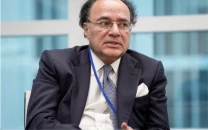Pensioners asked to get biometric verification
Move aimed at identifying ghost accounts to plug leakages in expenditure

The government has directed pension recipients to get their biometric verification done through the banks they are maintaining accounts or submit life certificates in March to better facilitate them and identify ghosts in order to control leakages in the ever growing pension expenditure.
“Pensioner shall be required to undergo biometric verification from any branch of a bank maintaining his/her pension account, every year in March and September,” State Bank of Pakistan (SBP) said in a notification on Monday.
“If the pensioner is unable to undergo biometric verification due to incapacitation by bodily illness, infirmity, or if his/ her fingerprints do not exist due to old age or a genetic condition, he/she will provide a life certificate as per the SOPs (standard operating procedures.”
“If a pensioner fails to submit a life certificate or fails to undergo biometric verification during March and September or a pensioner does not draw a pension for consecutive six months, the account shall become dormant.”
The central bank issued the new SOPs in the light of the amendments announced in SOPs for direct credit system (DCS) by the government on January 6 “in order to bring transparency and ease in the pension payment process…with immediate effect”.
The total number of pension recipients is estimated at over 2.5 million in a population of 208 million in Pakistan. They were estimated to having paid close to Rs1 trillion in the previous fiscal year, it was learnt.
In case of family pension (survivors including widows, sisters and daughters), non-marriage declaration shall be obtained from pensioners on or before September 30 each year instead of March and September.
Submission of the non-marriage declaration will be dispensed with after the widow, daughter or sister of the pensioner (family pension recipient) “attains the age of sixty years”.
“The requirement of submission of indemnity bond by a pensioner…is discontinued,” said the central bank. It clarified that the pension shall be paid through a bank account either current or PLS maintained in the pensioner’s name only. It shall not be a joint account. However, pensioner may use the account for other financial transactions.
“Public (government) pension expenditure in Pakistan is on the path to becoming unsustainable. While limited fiscal space is a major reason why increasing pension spending is worrisome, improvement in the pension framework can substantially help make future payments manageable,” stated the central bank in a study titled ‘Public Pension Expenditures in Pakistan - The Need for Reforms’ published last month (Jan 21).
“Eliminating the generous retrospective increments and reducing the list of dependents eligible for pension payments appear as quick and easy-to-implement measures.”
“In Pakistan…the pensions to GDP (gross domestic product) ratio stands at just 2.2%. The overall pension spending as a share of tax revenue has reached 18.7% as of FY20.”
According to the World Bank’s projections, civil service pension payments would overtake wage expenditures by 2023 and 2028 in Punjab and Sindh, respectively, and come near to their level in the federal government by around 2050, SBP said. The central bank’s study said the current framework lacks any form of a sizable fund that could finance the orderly payment of pension expenditures. In countries like Canada, Japan, Korea, and the USA, the government maintains two main categories of public pension reserve funds: the social security reserves mainly financed with employee and/or employer contributions; and the sovereign pension reserve funds which are financed through government fiscal transfers.
“However, in Pakistan, federal and provincial governments instead utilise fiscal revenues to discharge the retirement benefits and pension obligations. The continuity of this practice stands to yield incessant growth in pension expenditure and puts unsustainable pressure on the fiscal accounts.”
International Financial Institutions (IFIs), such as the World Bank and the International Monetary Fund (IMF), have also started flagging the rising pension expenditure as a pressing concern for Pakistan’s debt sustainability.
Published in The Express Tribune, February 2nd, 2021.
Like Business on Facebook, follow @TribuneBiz on Twitter to stay informed and join in the conversation.



















COMMENTS
Comments are moderated and generally will be posted if they are on-topic and not abusive.
For more information, please see our Comments FAQ